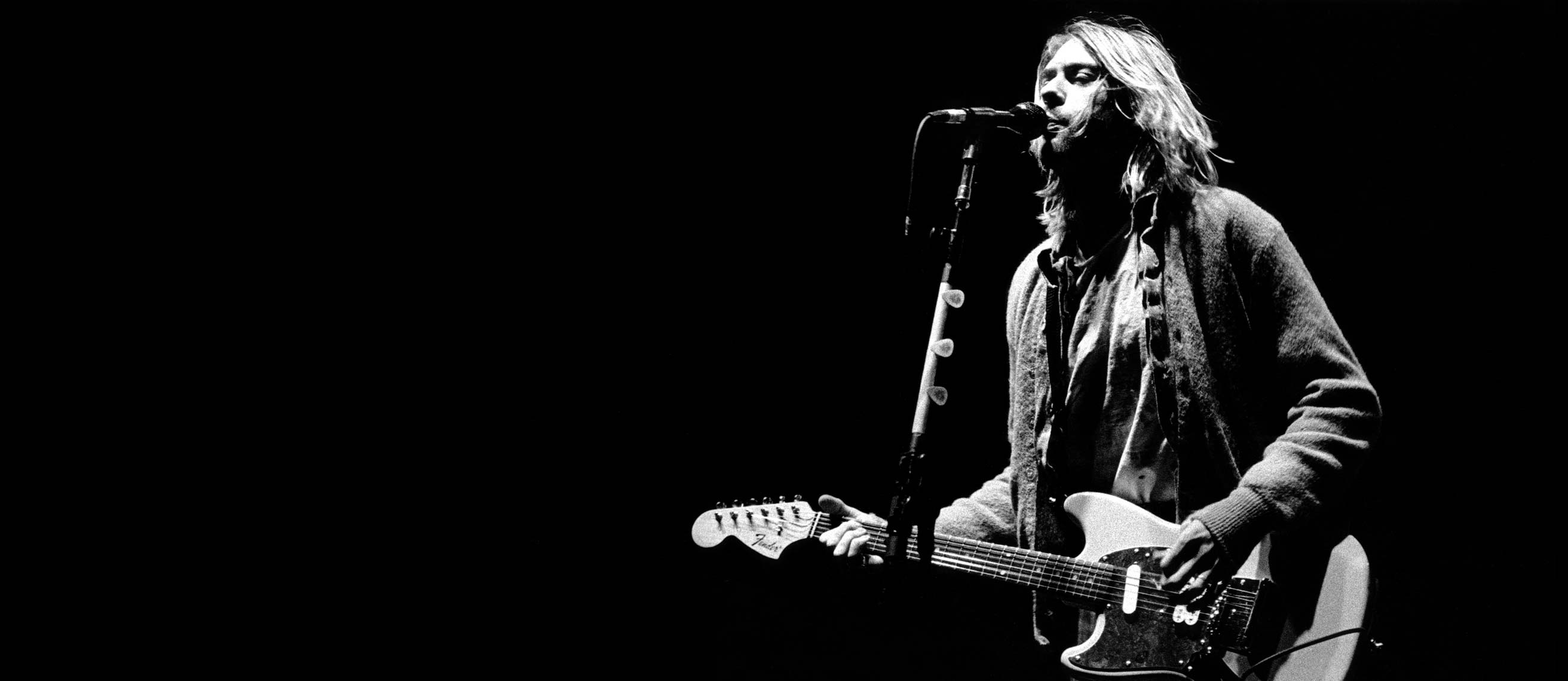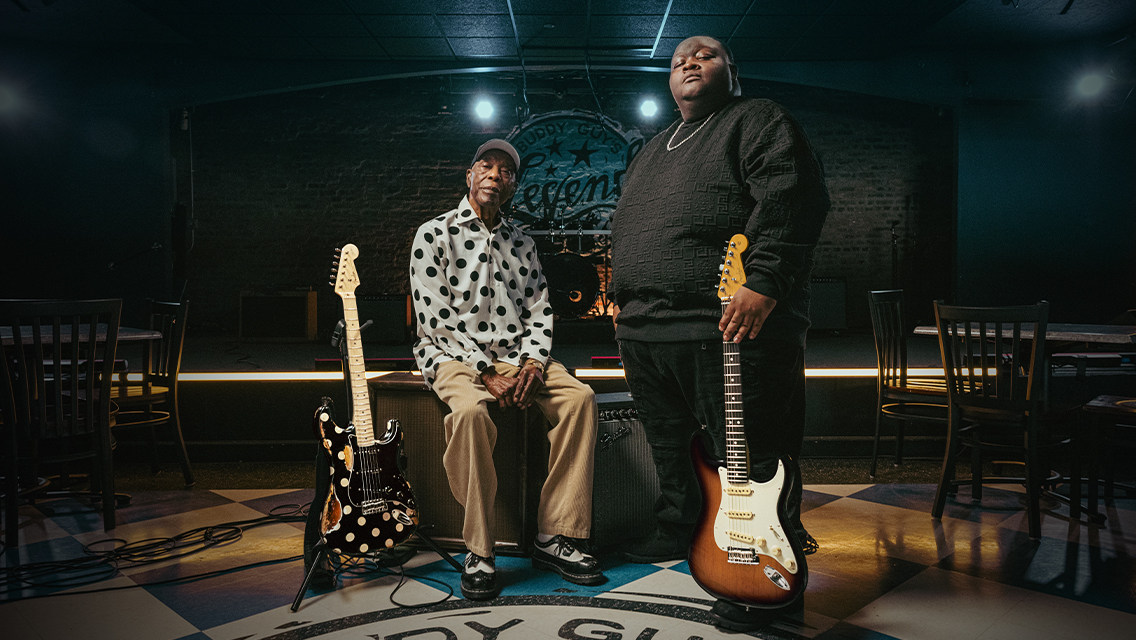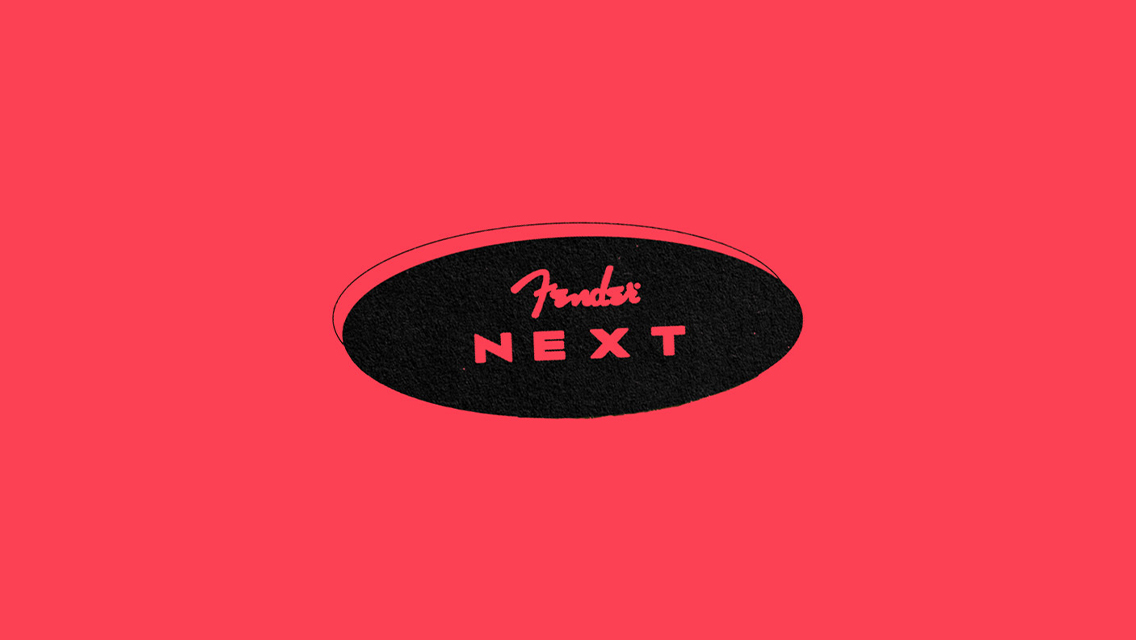
Sections
Even though he tragically passed away in 1994, Kurt Cobain remains a true inspiration to musicians across all genres.
Born in 1967 in Aberdeen, Wash., few modern artists have blazed a trail quite like Cobain. Forming Nirvana with bassist Krist Novoselic in 1987 and completely turned rock and roll on its head in the early 1990s before taking his own life in 1994, Cobain broke the mold as singer, songwriter and frontman.
Cobain had a playing style all his own, relying on power chords played on guitars tuned a half or whole step down. His solos were anything but, as he would typically offer variations of the on the song's melody, a practice he perfected like no other.
Coupled with his unmistakeable, growling voice, personal lyrics that sometimes drew from his own poetry and a stage presence that that both playful and menacing, Cobain became the face—albeit reluctantly—of a generation that grew up with Nirvana's three seminal studio albums Bleach (1989), Nevermind (1991) and In Utero (1993).
To date, Nirvana has sold over 80 million records worldwide, a testament to Cobain's lasting and wide-ranging appeal.
Need further proof? We have compiled several comments regarding Cobain's influence from artists across the musical spectrum.
“I remember watching Kurt come through and thinking, ‘God, this music is nuclear. This is really splitting the atom.’ They raised the temperature for everybody. Manufactured pop never looked so cold as when that heat was around. Nirvana made everything else look silly.” - Bono, U2, to Newsweek
“My first memory of Nirvana was getting a cassette of demos, which ended up becoming Bleach. Everybody's response was that this was an amazing band and these were amazing songs. It was another indication that the Northwest had something special that you couldn't argue with. It was pretty shocking to see a threepiece that sounded like that, and trying to get inside the head of a guy who writes a song like "Floyd the Barber"–where does the kernel of a song like that start?
“The Seattle scene benefitted from an MTV culture, and it was because of the way Nirvana looked and presented themselves that created this kind of unanimous support worldwide. Rock music had become kind of hedonistic–35-year-old men taking a helicopter to the stage and dating supermodels, and going out of their way to separate themselves from their audience. Nirvana, more than any other band, rocked way harder, had significant originality, while looking like guys you went to high school with. I think that was their secret. There was an inclusion that was long overdue, and it was what rock was supposed to be about. The legend isn't simply going to be the way that he took his life; I believe it will always be the songs.” - Chris Cornell, Soundgarden, to Rolling Stone
"He couldn’t play—and had no interest in trying to learn—Eddie Van Halen speed scales or incredibly complicated jazz chords. But he was a great player with an instinct for writing really great, hooky, rhythmic, riffy chord patterns. He had a kind of primal instinct for playing the guitar. And a lot of that comes from (his)punk background. You were forced to become your own teacher.” - Butch Vig, Producer of Nevermind, to The Washington Post
"I remember in seventh or eighth grade, when (Nevermind)dropped, it was like a bomb went off in my bedroom. For me, that song has always summed up what it means to be a teenager, and I think it tells a young boy that he can be sensitive and compassionate—he doesn't have to be tough or cold to be a man. So I wanted to make a very beautiful and pure homage to Kurt." - Sturgill Simpson to Zane Lowe on Beats 1
"When Nirvana hit, you had black kids into hip-hop watching MTV for alternative videos, getting into Red Hot Chili Peppers. Then Ice-T came out with Body Count. I think all that set the stage for Nirvana. And Nevermind was a damn near perfect album, like Bob Marley's Talkin' Blues or John Coltrane's A Love Supreme." - Talib Kweli to Spin
“Kurt Cobain’s improvisations are very impressive guitar solos because it’s more about his energy, his looseness, not trying to impress you with the flying fingers or whatever. Not adhering to things like staying in the right key–just play whatever note you want. That’s how it is in electronic music.” - John Frusciante to Fact Magazine
"I'm a big fan of Kurt Cobain. I put a picture of him holding a gun on my Instagram for his birthday. He's definitely one of my favorite rock artists. 'Heart-Shaped Box' is my sh-t. It was something different about him because he had a very challenged voice. They made a whole new movement—the indie rock, the grunge. He was like an amazing artist, man. The vocals, the lyrics, everything.” - Prodigy, Mobb Deep, to Complex
"In junior high, everyone was totally normal except for this alternative girl who was my friend. She had a giant Nirvana book I'd leaf through. I remember reading this story where Kurt came across this dead body; he got obsessed by writing about death. I love that crazy, gross, depressing stuff. But it was totally cool to hear a man with a feminist sensibility. Have you seen that Patty Schemel (Hole drummer)doc? There's this awesome footage of Kurt and Courtney and their daughter Frances, and he's like the coolest dad ever, you can tell he loves his daughter. I really like that song Dumb: 'I think I'm dumb/Maybe just happy.' Maybe it's better to be stupid and happy than caring about so many things. Or over-caring. I always think about those lyrics." - Jennifer Clavin, Bleached, to The Guardian
"When Nevermind came out, my roommate had the CD. At first, I actually thought, 'This is too polished and commercial.' It was a little off-putting. But then I was like, 'This is the best music ever.' It felt so close to what I wanted to do. I thought, 'I can write chord progressions like that. I can write melodies like that. This is something I can do.' This was right around when Weezer started. I probably wrote 'The Sweater Song' and 'The World Has Turned and Left Me Here' and 'My Name is Jonas' that month–all those early Weezer songs–and then we had our first rehearsal in February of '92. It's impossible to avoid the conclusion that Nevermind really inspired us to go for it.
"We were in the studio making the Blue Album when In Utero came out, and we were on the same label as Nirvana, so we got to hear it pretty early. It just deepened our love affair with Kurt. Somewhere in the back of my mind was the hope and the fear that some day I might meet him. I would love to have met him – but then again, I was afraid of it, because I was quite certain that he would despise my music and everything we stood for.” Rivers Cuomo, Weezer, to Rolling Stone
"I feel like I've always had this connection to Kurt Cobain. I named my band after one of his songs. I read his journals obsessively. It's spelled out there – starting a band from concept through to execution, and then the fall-out. The way he approached his own music was so meticulous, it was inspiring to me. I feel like we live in an age of faceless bands. Who's the biggest band now, the Black Keys? They look like a couple of accountants. I'm sick of meeting indie bands that are so f-cking nice. Kurt was kind-hearted but he was the ultimate rock star, in a way. He rejected mainstream ideals and tried to assert his personality as much as possible. He wrote about being called the voice of his generation: he was like, 'F-ck you, no I'm not.' But he really was." - Zachary Cole Smith, DIIV, to The Guardian
“Nirvana are like classic rock for us–they've always been there, you know? At first I couldn't hear a fucking word Kurt was saying; I just went by the melodies, which were so catchy. But even when you can't understand the words, you relate to it on an emotional level. The strain of his vocals; it's like he's dying, I love it. A lot of bands nowadays, they wanna be Kurt Cobain. I just laugh at that; Nirvana were completely themselves. One thing I love about Nevermind is that when he does a guitar solo there isn't an extra guitar playing the riff, it's just bass and drums. They kept it real. I used to record a lot of bands, and I worked with (Nevermind producer)Butch Vig once. We talked about Kurt one time. Everyone said he was a bummed-out dude, but Butch said he was super fun to hang out with. Always cracking jokes. It's a weird thing the public have put on him, that he was like an idol of depression. Nirvana were fun." - Zac Carper, Fidlar, to The Guardian
“I started playing guitar around the time that Nevermind came out. Being able to mimic something you idolize like that was really encouraging—which is probably why kids aren’t into super-prog jazz. They can’t do it. Anyone can play this stuff. But nobody can play it like Kurt Cobain.” - Jack Antonoff, Bleachers, to The Washington Post
Don’t miss out!
Be the first to know about new products, featured content, exclusive offers and giveaways.


